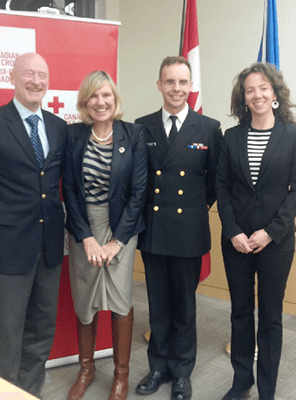How relevant is International Humanitarian Law (IHL) in modern conflicts? This depends on whether the laws are applied and respected. It’s also important to remember that “laws of war” are constantly changing. These are a few of the perspectives presented recently at the second annual International Humanitarian Law Conference held at the University of Calgary.
About 70 university students and senior legal professionals gathered for the event hosted by the Canadian Red Cross in partnership with the university. Also among conference guests was Tom Jackson, Canadian actor, singer, philanthropist, and Red Cross supporter. The day began with a thorough overview of International Humanitarian Law and its relationship to the Red Cross/Red Crescent movement by Catherine Gribbin, senior legal advisor for the Canadian Red Cross.
Commander Andrew Thomson, Director, Directorate of International & Operational Law, Office of the Judge Advocate General, addressed the question by examining real-world conflicts and their challenges.
After a coffee break where students and speakers had the opportunity to speak casually, a debate was sparked to explore “the relevance of education on International Humanitarian Law in the face of modern conflict.” Although all the panelists suggested education about IHL is important during times of war, they debated opposing positions to provide different perspectives on why IHL is not always upheld during tumultuous periods.
 |
| Left to right: Martin Lacourt, Kathleen Mahoney, Cdr. Andrew Thomson and Catherine Gribbin |
Panelist Martin Lacourt, Armed Forces delegate for the International Committee of the Red Cross (ICRC), suggested: “Law protects people only when it is respected...It is not the relevance of the law, but the application and respect.” Lacourt said in order to better teach the law it is crucial to integrate the law into practice, and this is why ICRC continues to assist militaries with education about IHL.
In the end, all speakers agreed that law protects people when it is respected. It is not just the relevance of law that matters, but rather the respect for it and the application that is also crucial.

